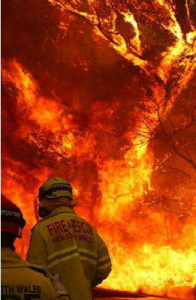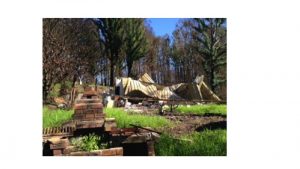David Wright
David works through the Social Ecology group in the School of Education, Western Sydney University. He is increasingly interested in how ecological understanding can be articulated, communicated and approached through effective learning programs. David has a background in writing for performance and drama and performance studies and brings this to work in his thinking about learning and social-ecological relationships. He is interested in and writes about transformative learning processes, through reference to critical inquiry, communication, critical reflection and creativity. He is interested in how schooling systems work with these processes and how they conceptualise and work to facilitate an ecological understanding in students faced with an uncertain future, under the shadow of climate change.[vc_column_text css=”.vc_custom_1591660430101{margin-top: 7% !important;margin-right: 7% !important;margin-bottom: 7% !important;margin-left: 7% !important;padding-top: 4% !important;padding-right: 4% !important;padding-bottom: 4% !important;padding-left: 4% !important;background-color: #ddcca8 !important;}”]Becoming aware of one’s awareness and understanding one’s understanding gives rise to a feeling of responsibility for what one is doing, for what one is creating… Once this has been understood, one cannot pretend any longer to be unaware of one’s understanding … Even those who deny this kind of awareness are ineluctably of it: for acting hypocritically and lying implies asserting something that contradicts one’s own insights… it is not understanding that entails responsibility but the knowledge of knowledge (Maturana cited in Poerksen 2004, p. 52).The Systems View of Life
Biodiversity is concerned with more than problems with the environment that require solutions… the problem is not nature, or the environment, nor is it with science… these are human problems derived from ways of thinking that require attention… these ways of thinking have an historical genesis… they are enacted across the breadth of contemporary culture – in different ways in different places … and it is these ways of thinking that need to be addressed if we are to move towards the healing that is required to actually and realistically celebrate biodiversity.
My experience in creative practice schooled me in thinking aboiut biodiversity and the sort of collaborative experience it exemplifies. I worked in writing for performance, and looking back I see this as a schooling in the relationship base of knowing: in my knowing. It taught me that to know X I need to know it in relation to something else. Water in relation to land; sunlight in relation to means of capturing it; soil in relation to fertility; correct action in relation to vested interests.
Self-organisation and systems theory, which are core to an effective understanding of biodiversity, are interconnected. The systems view of life which, in the words of Fritjof Capra “integrates life’s biological, cognitive, social and ecological dimensions”, is a way of thinking that focuses on connectedness and relationships. For me it opens up my understanding of my own practice: from creative expression, to biology, and back to social communication. I requires I ask questions like: ‘what does it feel like… how do I talk about it… how do I capture it in language?” Taking these challenges from science and applying them to social understanding and most especially to my work in education has been central to my academic history.How do we learn within biodiversity?
In this process… key questions for me have been around ecological understanding. What is it? Is it a verifiable phenomena? Is it a perspective? A feeling, a way of thinking or understanding? Is it best approached through reference to ecological science? Because of the significance of considerations of this kind for our future, for me as an educator, the issue goes beyond what it is to can it be taught, or more accurately, can circumstances be constructed that contribute to its emergence? If we are to celebrate biodiversity there needs to be some felt experience to celebrate.
Then, can I teach others? Do I have that capacity, that critical self-awareness? OR can I try to set up circumstances for my students learning, for their own, their personal understanding to arise, in their experience so that it is their learning, not a summary of mine?
Central to such learning, I argue, is experiencing and understanding yourself amidst this process. We, and our social learning, define ecological understanding. It changes as we change, as we learn more. In this respect the
Covid 19 experience teaches us so much about self-organisation and our relationship to ‘the wild’. Additional information, new perspectives, new insights are extending understanding and creating new responsibilities. And we all live amidst this conflict. We are all participants in this process of knowledge generation: this living, knowing of biodiversity.
Addressing these issues, I have sometimes asked my students, ‘When did you get it?’ By this I mean, when and how did you come to understand and appreciate yourself as caught within the ecological systems that comprise the earth. When did your perspective upon your own experience expand to appreciate this? And I have received a wide range of answers. ‘Watching a spider weave its web.’ ‘Standing in a redwood forest.’ ‘Getting humbled by powerful theory.’ And I have asked the question of myself. When, and how did you get it? Through social experience, through reflection, through deep sensing. The subsequent question is:
‘How do I take responsibility?’ What do I do?
The central precept of a SOCIAL-ECOLOGICAL perspective is that ‘it’ is inescapable. We live amidst ‘it’ all the time. It is the consequences of our actions. ‘No action’ does not exist. No responsibility is not an option. To do nothing is itself an action, and the consequences of this can be as significant as any other more obvious action. So many of my students, especially the younger ones, claim not to know, not to be responsible, not to have perspective. What they actually lack in an awareness of their participation, their contribution and their complicity.Learning from Australia’s Black Summer
 In 2019 bush fires started in the north coast of NSW in August. In December, at various times the huge city of Sydney was surrounded. One massive fire raging to the north, another to the north west, another to the south west. And in January the fires took off along the south coast, then inland into the mountains. They say that the area that was burnt was almost equivalent in size to England. Australia is very a large country, it can contain many Englands, but most people in the country were affected by this, directly or indirectly. And these fires had been predicted. No-one could say we weren’t warned. Being warned about fire is a different thing to preparing for the arrival of fire.
In 2019 bush fires started in the north coast of NSW in August. In December, at various times the huge city of Sydney was surrounded. One massive fire raging to the north, another to the north west, another to the south west. And in January the fires took off along the south coast, then inland into the mountains. They say that the area that was burnt was almost equivalent in size to England. Australia is very a large country, it can contain many Englands, but most people in the country were affected by this, directly or indirectly. And these fires had been predicted. No-one could say we weren’t warned. Being warned about fire is a different thing to preparing for the arrival of fire.
The social-ecological relationships here are very clear. Climate is changing, droughts have contributed to a drying of the land, growing populations are pushing the construction of homes deeper and deeper into bush areas – biodiversity out of balance – humans triumphant. In many instances people are unwilling and unable to prepare adequately. And then there is the fire itself… flames 100 metres into the air… climbing cliff faces… tossed around by wind… racing over farms and roads and through forests… unstoppable.
The power of the flames was extraordinary.
 In the south, where I have a property about 5 km from the coast, on New Years Day the fires ran about 50 kms, from the hills behind Nelligan, skimming the south of Batemans Bay, through Mogo and the catchment area for the local dam and came sweeping up from a gully, jumped the road and took out house after house after house – about three hundred in my area – in less than an hour. My house went (we weren’t on the property). My neighbour lost his house but escaped with his life. Only just. Another neighbour fought the fire back from his house for 8 hours and survived with bad burns to the upper part of his body.
In the south, where I have a property about 5 km from the coast, on New Years Day the fires ran about 50 kms, from the hills behind Nelligan, skimming the south of Batemans Bay, through Mogo and the catchment area for the local dam and came sweeping up from a gully, jumped the road and took out house after house after house – about three hundred in my area – in less than an hour. My house went (we weren’t on the property). My neighbour lost his house but escaped with his life. Only just. Another neighbour fought the fire back from his house for 8 hours and survived with bad burns to the upper part of his body.
As I look back I wonder about our relationship to fire: the respect it requires. It is just not an issue of more and better firefighting equipment. Fire is a part of living nature and living nature is a knowledge system: a complex web of dynamic inter-relationships that determine the forms that life takes. Where does humanity sit in this complex web?The Importance of Local
Traditionally Australian Aboriginal people have talked of themselves as ‘custodians of country’. We, the settlers, the colonisers, the late arrivals in Australia: are we custodians? Do we care for our country? What does ‘to care for’ mean? Does care mean to celebrate? What is the substance of any celebration? This question is of considerable relevance when we see one of the most powerful corporations in the nation blow up 40,000 years of Aboriginal history: and the Prime Minister barely raise an eyebrow.
Any program in Social Ecology needs to be discussed in relation to its own particular social ecology: that the local creates knowledge and this requires responsibility.
In our work with our students our approach to localising the discourse has the effect of depicting ‘social ecology’ as a way of understanding unfolding relationships in a changing world based on local experience, rather than a static body of knowledge determined through a global discourse. This invites students’ active engagement in that which is taught. It engages them in their social ecology: their local and its assumptions, its conceptualisation, its influences, its processes and its validity. It’s biodiversity. It helps them to recognise that in their social ecology, their participation contributes to its future.
What then is my local experience? How do I celebrate the biodiversity of my local environment How do I, through my actions, ‘bring forth our world’? This wonderful phrase… ‘bring forth my world’, used by Fritjof Capra, under the influence of cognitive biologists Humberto Maturana and Francisco Varela, is a way of representing this process that links creativity, knowledge and responsibility. It is what we all do, so often unthinkingly.

![Call of the Dakini | A Memoir of a Life Lived [Extract]](https://regenesis.org.au/wp-content/uploads/2023/08/Catalogue-OF-Articles-by-Barbara-Lepani-July-2018-July-2023-.jpg)
Recent Comments